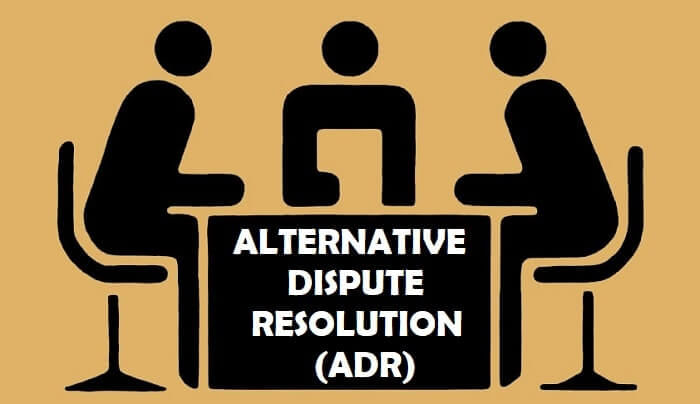Legal Terms (A-C) | Legal Reasoning for CLAT PDF Download
| Table of contents |

|
| Legal Terms |

|
| A |

|
| B |

|
| C |

|
| Passage for Practice |

|
Legal Terms
The language used in law is changing. Many lawyers are now adopting a plain
English style. But there are still legal phrases that baffle non-lawyers.

A
- Ab initio: (Latin) from the beginning.
- Abandonment: giving up a legal right.
- Acceptance: is one of three requirements for a valid contract under common law (the other two being offer and consideration). A contract does not become legally binding until one party has made an offer and the other party indicates his readiness to accept the terms of the offer.
Acceptance must be unconditionally communicated to the offeror while the offer is still open. Acceptance of an offer can, in certain circumstances, be implied by conduct. - Accord and Satisfaction: A contract may be discharged if one party, who has complied with his part of the contract, accepts compensation from the other party instead of enforcing the contract. The accord is the agreement by which the obligation is discharged. The satisfaction is the consideration (usually money and of a lesser value) which makes the agreement operative.
- Acquiescence: Action or inaction which legally binds someone, even unintentionally.
Example: An action such as accepting goods from a supplier will be binding if it implies recognition of the terms of a contract.
 Acquiescence
Acquiescence
- Act of God: An event resulting from natural causes, without human intervention (such as floods or earthquakes). Insurance policies often exclude acts of God.
- Action: Proceedings in a civil court.
- Adjournment: Postponement of a hearing by a judge on whatever terms he sees fit.
- Administrative law: Law which applies to hearings before quasi-judicial or administrative tribunals. Such hearings must be conducted in accordance with the principles of natural justice, such as audi alteram partem and nemo judex in sua causa.
- Administrator: A person appointed to manage the property of another (such as the administrator of the estate of someone who has died without leaving a will).
- ADR: Alternative dispute resolution (such as arbitration, mediation and conciliation).
- Adverse possession: Possession of land, without legal title, for long enough – normally 12 years – to be recognized as the legal owner (“squatter’s rights”).
- Affidavit: Sworn written statement signed by a deponent, who swears that its contents are true to the best of his knowledge and belief. It must be witnessed by a practising solicitoror commissioner for oaths.
- Agent: Person with power to contract on behalf of others, binding them as if they were signing the contract themselves. The person represented by the agent is called the principal.
- Aggravated damages: Exceptional damages awarded by a court where a defendant’s behaviour towards the plaintiff or victim has been particularly humiliating, malicious or vindictive.
- Alternative dispute resolution: Method by which conflicts and disputes are resolved privately, other than through litigation, usually by mediation or arbitration. ADR involves the appointment of a third - party to preside over a hearing between the two sides.
 The advantages of ADR are privacy and speed. The disadvantage is that ADR may involve compromise of legal rights.
The advantages of ADR are privacy and speed. The disadvantage is that ADR may involve compromise of legal rights. - Antedate: To date retroactively, before a document was drawn up.
- Appeal: Challenge to a court decision in a higher court.
- Appearance: The act of replying to a summons or turning up in court and accepting its jurisdiction to try proceedings. A barrister or solicitor may make an appearance on a client’s behalf.
- Appellant: Person who makes an appeal.
- Arrears: Accumulated debt which has not been paid on the due date.
- Assault: Touching – or threatened touching – of another person, without that person’s consent.
- Assign: To give or transfer responsibility to another person. The person who receives the right or property is the assignee; the assignor is the person giving.
- Attachment and committal: Bringing a person before a court, with a threat of imprisonment for failure to obey a court order.
- Attachment of earnings: Court order for deduction of salary at source in order to pay.
Example: maintenance or a debt.
- Attorney General: Legal adviser to the Government, appointed by the President on the advice of the party in power.
- Audi alteram partem: (Latin: hear the other side) A principle of natural justice which requires that, where a decision may affect an individual’s rights, that person has a right to be heard. It includes the right to receive notice of a hearing and to be legally represented.
B
- Bailee: Person who accepts property through a contract of bailment, from the bailor, and who has certain duties of care while the property remains in his possession.
- Bailment: Temporary transfer of goods by a bailor to a bailee (for example, for storage), after which the property is either returned to the bailor or disposed of according to the contract of bailment.
- Barrister: Specialist in litigation and advocacy who receives instructions from a solicitor. Barristers may not normally deal directly with members of the public.
- Beneficiary: Person who receives a gift under a will, or for whose benefit property is held by an executor or trustee.
- Bill of exchange: Written, signed instrument requiring the person to whom it is addressed to pay on demand (or on a future date) a fixed amount of money either to the person identified as payee or to anyone presenting the bill of exchange. A cheque is a form of bill of exchange.Question for Legal Terms (A-C)Try yourself:What is Audi alteram partem?View Solution
- Bill of lading: Document used in foreign trade, acknowledging that a company has received goods for transportation. The Bill serves as title to the goods until they have reached their destination.
- Breach of contract: Failure or refusal to fulfill a term of a contract. The injured party may bring an action for damages, for enforcement or for cancellation of the agreement.

- Burden of proof: A rule of evidence that requires a party to a court action to prove something, otherwise the contrary will be assumed by the court.
Example: In criminal trials, the prosecution has the burden of proving the accused guilty beyond a reasonable doubt (because of the presumption of innocence).
C
- Case law: Published court decisions which establish legal precedents, binding lower courts.
- Caveat: (Latin: let him beware) A formal warning. Caveat emptor (let the buyer beware) is a warning to buyers to check for themselves things which they intend to buy, so they cannot later hold the vendor responsible for the faulty condition of the item. The Sale of Goods and Supply of Services Act 1980 extends the rights to consumers in this area.
- Central Criminal Court: The High Court sitting to deal with serious criminal offences, such as rape and murder.
- Certiorari: Form of judicial review whereby a court is asked to set aside the decision of an administrative tribunal, judicial officer or public organisation. Certiorari may be used where the decision of the lower tribunal was made in breach of the rules of natural justice. An application for certiorari must normally be made within six months of the decision.Question for Legal Terms (A-C)Try yourself:What is meaning of Caveat?View Solution
- Chambers: Judge’s personal rooms, where he may hear matters in private.
 Chamber
Chamber
- Charge: Form of security for payment of a debt.
- Chattels: Movable items of property which are neither land nor permanently attached to land or a building. (Land or buildings are described as “real property”.) Chattels are also known as personal property (or personality). A freehold property is not a chattel, but a leasehold is.
- Cheque: Form of bill of exchange where the order to pay is given to a bank holding the payor’s funds.
- Child: Person under 18.
- Circuit Court: Court above the District Court and below the High Court, with power to award damages up to €38,100.
- Circuit Judge: Judge of the Circuit Court, addressed as “My Lord” whether male or female.
- Class action: Legal action taken by a number of different persons where the facts and the defendants are similar. Class action lawsuits may occur,
Example, after a public transport accident or in the case of a faulty drug, where all the victims sue the same defendant.
- Clayton’s Case: This English case established a presumption that money withdrawn from an account is presumed to be debited against the money first deposited (first in, first out).
- Codicil: Written amendment or addition to an existing will.
- Collateral: Property committed to guarantee a loan.
- Collusion: Illegal and usually secret agreement between two or more people to deceive a court or defraud another person.
- Common law: Judge-made law which has developed over centuries, also referred to as “unwritten” law. Common law (as practised in Ireland, England and the USA) is often contrasted with civil law systems (such as in France or Germany) where laws are set down in a written code.
- Company: Legal entity which permits a group of shareholders to create an organization to pursue set objectives. A company may have legal rights which are usually reserved for individuals, such as the power to sue and be sued, own property, hire employees or lend and borrow money.
The main advantage of a company structure is that it gives shareholders a right to participate in profits (through dividends) without any personal liability. - Consent order: Court order agreed between both sides.
- Consideration: Consideration has been defined as “some right, interest, profit or benefit accruing to the one party, or some forbearance, detriment, loss or responsibility given, suffered or undertaken by the other”.
Under common law, any binding contract must have some consideration, no matter how small. The courts will not normally inquire into the sufficiency of the consideration; a “peppercorn rent” would be sufficient. - Consign: To leave property in the custody of another. An item can be consigned to a transport company, for example, to move it from one place to another. The consignee is the person who receives the property and the consignor is the person who ships the property to the consignee.
- Construction: Legal process of interpreting a phrase or document. If a term is unclear or ambiguous, lawyers and judges must try and interpret (or construct) its probable intention and purpose.
This may be done by referring to other parts of the document, by reference to the known intentions of those who drew up the document, or, in the case of statutes, by referring to an interpretation law which gives guidelines for construction. - Constructive trust: Trust imposed by a court in certain circumstances, regardless of the intention of the parties involved (such as where a trustee has improperly profited from his position).
- Contempt: Deliberate disregard of a court order.
- Contract: Agreement between two or more persons which obliges each party to do (or refrain from doing) a certain thing. A valid contract requires an offer, acceptance of that offer and consideration.
- Contract law: Contract law is the basis of all commercial dealings. The terms of a contract may be express or implied. Express provisions may be varied by statute. Unfair contract terms are now excluded by legislation, and, in areas such as employment and the sale of goods, the law imports a wide range of implied terms into new and existing contracts.
- Contributory negligence: Negligence which is not the primary cause of a tort, but which combined with the act or omission of another person to cause the damage.
Example: In the case of a car crash, an injured driver who was not wearing a seat belt may be found contributorily negligent for his injuries.
Conversion: Legal proceeding for damages by a property owner against a defendant who found property and converted it to his own use – that is, retained it or otherwise interfered with it.
Conveyance: Written document transferring property from one person to another. Conveyances are usually drafted by solicitors.
Costs: The legal expenses of an action, such as lawyers’ fees, witness expenses and other fees paid out in bringing the matter to court. The rule is generally that “costs follows the event”, which means that the loser normally pays the legal costs of both sides. The judge has the final decision and may decide not to make an order on costs.
Counsel: Barrister(s).
Counterclaim: Respondent’s claim against a plaintiff in the same action.
Covenant: Written document in which signatories either commit themselves to do (or not to do) something, or in which they agree on a certain set of facts. Covenants are very common in leases where a landlord will usually covenant to give the tenant “quiet enjoyment” and the tenant covenants to pay the rent, keep the premises in good repair and deliver them up at the end of the tenancy.
Creditor: Person to whom money, goods or services are owed by a debtor.
Crime: Act or omission forbidden by criminal law. The commission of a crime is punishable by a fine, imprisonment or some other form of punishment. Crimes are divided into minor offences (which may be tried in the District Court) and indictable offences, which are tried by a judge and jury in the Circuit Court or Central Criminal Court.
Cross-examination: In a trial, each side calls its own witnesses and may also question the other side’s witnesses under oath. Examination-in- chief is the questioning of a party’s own witnesses; cross - examination involves questioning the other side’s witnesses. A party may not put leading questions (which suggest the answer, or require a simple yes or no) to his own witness, but he may ask such questions in cross-examination.
Curtilage: Land around a dwelling house, used by the occupants for their enjoyment or work. Curtilage may be enclosed by fencing and includes any outhouses such as sheds, garages or workshops.
Passage for Practice
Another telling example of the snail-paced Indian judicial system, an aberration that has got institutionalised, is the verdict delivered by a Mathura court. Eleven former Rajasthan policemen have been convicted and given life sentence for gunning down Raja Man Singh of Bharatpur and two colleagues in Deeg area in 1985. The case was first heard in a Rajasthan court but got shifted to Uttar Pradesh on instructions from the Supreme Court. It took more than 1,700 hearings and 35 years for a judgment to be pronounced. Shiv Charan Mathur, the Congress Chief Minister, incidentally had to resign within days of the killings.
A staggering 60,000-plus cases are pending in the apex court itself, 44 lakh in high courts. When cases take two to three decades to be settled, public confidence in the efficacy of the judicial system, routinely described as broken, is bound to be low. Ironically, despite the long-winding and stressful process, the hope that justice will one day be delivered has not ebbed. Much could have been done to build on this faith. There is still ample opportunity for courts to set the house in order. If fast-track courts are possible, so is a serious relook at suggestions such as tweaking working hours, coming down hard on frivolous petitions, discouraging government litigation, encouraging settlement and term-bound handling of election-related complaints. Particular attention is needed to put a cap on appeals and adjournments.
Vikas Dubey getting bail despite several cases registered against him was termed a failure of the institution by the apex court, which while hearing a petition on the gangster’s encounter told the UP Government to uphold the law. The rule of law is the only acceptable way, but so is the law taking its own course without delay.
[Excerpt from The Tribune "Judgment after 35 yrs" dated July 2020]
Q1. What is the primary concern discussed in the passage?
(a) The large number of pending cases
(b) The time courts in India take to resolve cases
(c) Neither (a) nor (b)
(d) Both (a) and (b)
 View Answer
View Answer 
Ans: (d) Both (a) and (b)
The passage highlights both the pendency of a large number of cases in Indian courts and the prolonged time taken to resolve them. Both issues are interconnected and collectively form the crux of the concern being addressed.
Q2. What is the meaning of the word “aberration”?
(a) Deviation
(b) Abnormality
(c) Irregularity
(d) All of the above
 View Answer
View Answer 
Ans: (d) All of the above
The word "aberration" can mean deviation, abnormality, or irregularity. All these meanings align with its usage, as it refers to something that deviates from the norm.
Q3. What does the phrase “has not ebbed” signify?
(a) Has remained unchanged
(b) Has not diminished
(c) Has not increased
(d) None of the above
 View Answer
View Answer 
Ans: (b) Has not diminished
The phrase "has not ebbed" implies that something has not decreased or subsided. The word "ebb" often refers to a reduction or decline, as in the receding of a tide.
Q4. From the information in the passage, which authority can transfer a case from one Indian State to another?
(a) The High Court of the State from which the case is being transferred
(b) The High Court of the State to which the case is being transferred
(c) The Supreme Court
(d) None of the above
 View Answer
View Answer 
Ans: (c) The Supreme Court
As per Indian legal provisions, only the Supreme Court has the jurisdiction to transfer cases between states to ensure justice and maintain impartiality. High Courts do not have this authority.
Q5. In the context of the statement, “Vikas Dubey getting bail despite multiple cases against him was termed a failure of the institution,” what does the term “institution” refer to?
(a) The judiciary
(b) The executive
(c) The legislature
(d) Cannot be determined
 View Answer
View Answer 
Ans: (a) The judiciary
The term "institution" in this context refers to the judiciary, as granting bail is a judicial function. The failure points to perceived inadequacies in the judicial system, which allowed a person with a criminal background to be released on bail.
|
63 videos|174 docs|38 tests
|
FAQs on Legal Terms (A-C) - Legal Reasoning for CLAT
| 1. What is CLAT? |  |
| 2. What are the eligibility criteria for CLAT? |  |
| 3. What is the exam pattern for CLAT? |  |
| 4. What is the syllabus for CLAT? |  |
| 5. How can I prepare for CLAT? |  |
















